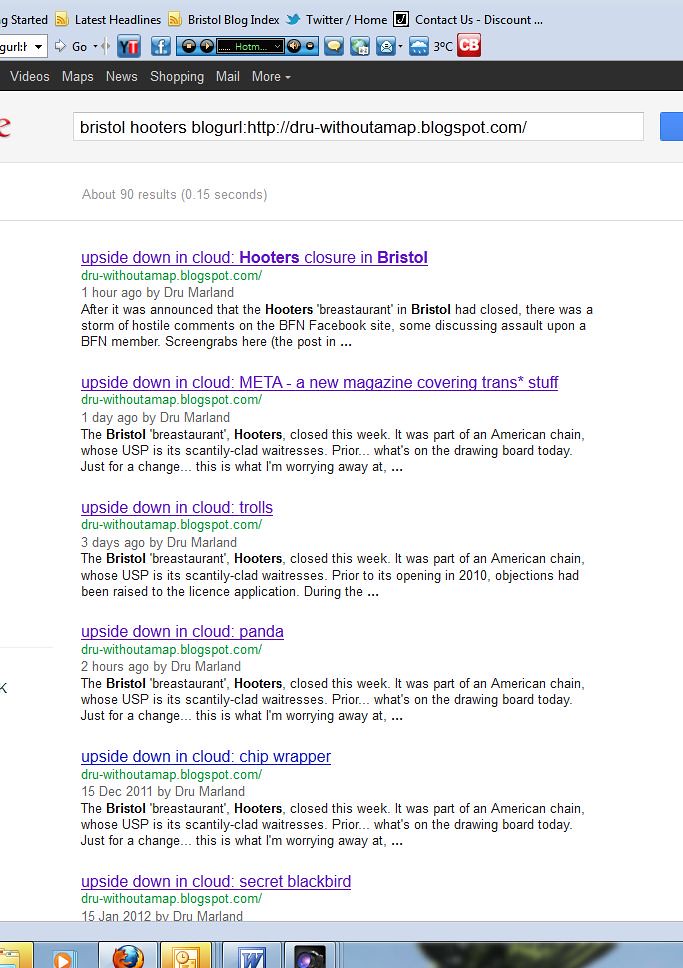Tuesday, 14 February 2012
becoming invisible
Every now and then, a blog post becomes practically invisible to Google searches. By which I mean that, unless you enter very specific search terms, it simply does not show up. It happened back in 2010 when I wrote about the opening of a new restaurant in Bristol; and it happened again when I wrote about the recent closure of that same restaurant, and the unpleasantness that was associated with it, by former employees and their 'supporters' attacking the local feminist group online, .
As you see, with search terms and the URL of the specific blogpost, it appears, like this
....otherwise, nowhere to be seen.
So I wrote a second post linking to the first, and it appeared in search results, thus (note that the original post is still invisible, though)
...and that was fine too. Until this morning. Now that's disappeared from search results as well.
Subscribe to:
Post Comments (Atom)




Hmmm. Pretty sinister. Who's responsible?
ReplyDeleteLucy
It's like the old cross-dressing adage: "Once, unlikely, Twice, might be, Three times, definitely!".
ReplyDeleteIt's easy to finger the culprit. Reputation management companies, armed with sentiment analysis software that flags up negative posts. Less easy to pinpoint is the method they use to poison the indexes. If I were trying it I'd spam the search engine with ultra-low-value inbound links to that page, but I'd then expect to see them in a Google search.
I'm finding that Google is no longer as efficient a search engine as it used to be.
ReplyDeleteIt's too geared to commercial aims now and is becoming less of a useful research device alas.
Jenny has a good point too, maybe alongside metakeys there is this reverse hidden keycodes to prevent a search if it contains negative aspects however true.
So the original intent of the internet for the people gets further subverted.
Alan
Didn't Google change the algorithm a while back such that the age of the blog post plays a 'significant' part in the ranking position - I guess to combat the likes of Twitter. I've noticed this happen with completely non-contentious posts of my own.
ReplyDeleteI wouldn't put it past some companies to attempt 'Googlewashing' but I'd think it risky for the better known brands to do this?
There are some things that just disappear.
ReplyDeleteI think that it is word triggered sometimes, but not others..
I have posted a link on " Google+" saying that a good reputation is easily lost!
ReplyDeleteToo close to censorship, what happened to all that free speech we were promised?
The odd thing, Phil, is the common characterisitc in the posts that have disappeared in the past- one that was critical of the Little Britain blokes in a Nationwide ad; and the ones about H***ers. They went from being v high in the search results to being as near completely invisible as makes no odds. This compares with other of my posts which remain near (or in some cases at) the top of search results. The inconsistency is too great to be explained away by natural attrition; something is up.
ReplyDeleteHi Dru: Blogspot doesn't populate meta tags automatically, so your pages have no meta title, meta description or meta content. Google favours pages that show common terms and phrases in meta tags, title tags and page content (and content titles such as on images). Google [hooters dru] and you get something unique, so you're there, but any page that has "hooters" in title, meta and content will trump yours. Is there a blogspot facility for meta tagging and titling your posts and pages? I use one in Wordpress that seems to work very well.
ReplyDeleteI guess I should defend what is after all peripherally still my industry.
ReplyDeleteSearch engines aren't the villain here, and we can be confident it's not a meta tag related issue.
What I think has happened is that a reputation management company employed by a brand to protect that brand is exploiting weaknesses in the Google spam recognition algorithm.
Search engines demote pages they think are of little value, which perhaps are trying to game their ranking with content of dubious worth. It's an automatic process driven by algorithms and it's not perfect despite a lot of work being put in to make it as good as possible. If you can persuade the algorithm that a given page is of dubious worth, then you can send that page into oblivion. At a guess they have link farms that copy the spammers techniques on their targets, and we're seeing the results.
It's most likely to be an automated process and not specific to Dru's site. Yes, it's dodgy that brands employ these kind of reputation management companies, but at least we can see what's going on.
(BTW, Google for one do not like this being done to them and if they find it they fix it DAMHIK etc... )
Thank you, Jenny; it was a bit bothersome writing up this blog post because I anticipated some resposes along the lines of 'don't be paranoid'. Would it be worth my reporting this to Google, I wonder?
ReplyDelete